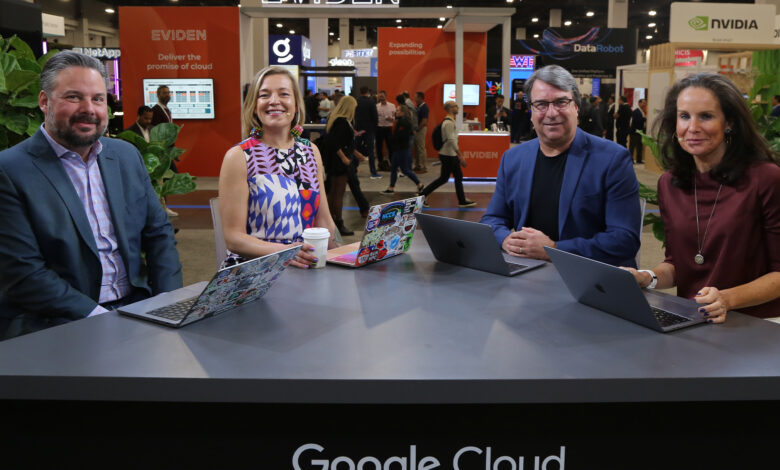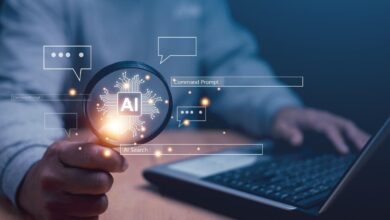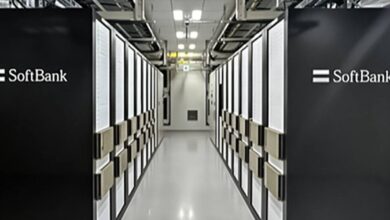Gen AI-driven transformation at Google Cloud Next

A transformative wave has hit the technology and business landscapes, notably underscored by the advent of generative artificial intelligence.
At this week’s Google Cloud Next, the spotlight is on how gen AI is reshaping the workplace and, by extension, the job market.
“I love the gen AI use cases. The enterprise under the covers use cases is going to cause all kinds of disruption, and there’ll be winners and losers,” said John Furrier (pictured, second from right), executive analyst at theCUBE Research. “We talk about that all the time, but the whole AI editing with photos … the watermarking that came out yesterday … and then you’ve got the coding piece of it.”
Furrier, along with his co-analysts, Rebecca Knight (right), Savannah Peterson (second from left) and Rob Strechay (left), kicked off day two of Google Cloud Next 2024, during an exclusive broadcast on theCUBE, SiliconANGLE Media’s livestreaming studio. They discussed key insights, the expanding Google LLC partnership and how AI will shape the future. (* Disclosure below.)
Google Cloud’s evolution: Growing partnerships and gen AI’s impact
This week’s event focuses on the thriving ecosystem surrounding Google Cloud and its partnership model. Notably, theCUBE analysts noticed enhanced partnership at the event compared to previous events, which signals a significant shift in Google’s strategy and market perception. The doubling of attendee numbers and the robust engagement of partners and developers are testament to Google’s growing influence and potential to cultivate a formidable ecosystem comparable to other tech giants, according to Strechay.
“The vibrancy of the community that is here and the fact that so many partners are here, there’s just a sense of partnership with Google that I’m not sure I saw back in the fall,” he said.
Amid this ecosystem expansion, the rapid pace of innovation and product announcements, particularly in generative AI, stood out as a major theme. The industry stands at a critical juncture in regard to AI-driven workplaces.
“You cannot not know how to work with generative AI, because if it doesn’t replace your job, it will change your job,” Knight said. “These are really important topics that we’re discussing.”
The enthusiasm for the potential of AI to revolutionize industries and work practices underscores a broader narrative of anticipation and adaptation to the technologies shaping the future.
AI at the crossroads: Redefining work, mentorship and society’s path forward
The implications of these technological advancements on the workforce and the broader societal context are profound, reshaping job markets, altering industries and presenting both challenges and opportunities for society at large. The analysts discussed the impact of AI on job displacement, the evolving nature of work and the opportunities for new kinds of employment and societal benefits.
“What does AI bring opportunities for people that can’t get those jobs? They’ll go away in the entry level, the grunt work, but it also shifts. We’ve seen that with big data before,” said Furrier, suggesting a dynamic where AI could democratize access to prosperity and skill development.
Mentorship and training are also crucial in the AI-augmented workplace. With generative AI poised to automate routine tasks, there’s a growing concern about the erosion of entry-level positions traditionally serving as stepping stones for career advancement. Yet, this transition also presents a call to action for organizations to reimagine talent development and harness AI’s potential to foster a more knowledgeable and versatile workforce.
Google Cloud Next thus stands as a microcosm of the larger shifts occurring in the tech industry, offering a glimpse into the future where technology, business and societal progress are increasingly intertwined, according to theCUBE analysts. The discussions at the event reflect a collective acknowledgment of the challenges and opportunities that lie ahead, underscoring the importance of collaboration, innovation and strategic foresight in navigating the AI-driven landscape.
“Google’s got some momentum; they shared some stats,” Peterson said. “Ninety percent of gen AI unicorns are Google Cloud customers. Sixty percent of gen AI startups use the Google Cloud platform. That is quite a bit of saturation in this new emerging market.”
Stay tuned for the complete video interview, part of SiliconANGLE’s and theCUBE Research’s coverage of Google Cloud Next 2024.
(* Disclosure: TheCUBE is a paid media partner for Google Cloud Next 2024. Neither Google LLC, the primary sponsor for theCUBE’s event coverage, nor other sponsors have editorial control over content on theCUBE or SiliconANGLE.)
Photo: SiliconANGLE
Your vote of support is important to us and it helps us keep the content FREE.
One click below supports our mission to provide free, deep, and relevant content.
Join our community on YouTube
Join the community that includes more than 15,000 #CubeAlumni experts, including Amazon.com CEO Andy Jassy, Dell Technologies founder and CEO Michael Dell, Intel CEO Pat Gelsinger, and many more luminaries and experts.
THANK YOU



